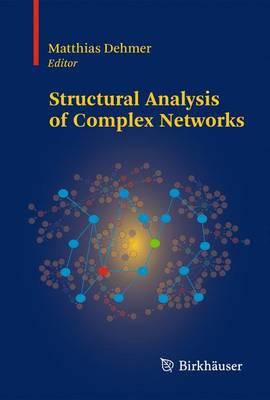Overview
Because of the increasing complexity and growth of real-world networks, their analysis by using classical graph-theoretic methods is oftentimes a difficult procedure. As a result, there is a strong need to combine graph-theoretic methods with mathematical techniques from other scientific disciplines, such as machine learning and information theory, in order to analyze complex networks more adequately. Filling a gap in literature, this self-contained book presents theoretical and application-oriented results to structurally explore complex networks. The work focuses not only on classical graph-theoretic methods, but also demonstrates the usefulness of structural graph theory as a tool for solving interdisciplinary problems. Special emphasis is given to methods related to: applications in biology, chemistry, linguistics, and data analysis; graph colorings; graph polynomials; information measures for graphs; metrical properties of graphs; partitions and decompositions; and quantitative graph measures. Structural Analysis of Complex Networks is suitable for a broad, interdisciplinary readership of researchers, practitioners, and graduate students in discrete mathematics, statistics, computer science, machine learning, artificial intelligence, computational and systems biology, cognitive science, computational linguistics, and mathematical chemistry. The book may be used as a supplementary textbook in graduate-level seminars on structural graph analysis, complex networks, or network-based machine learning methods.
Full Product Details
Author: Matthias Dehmer
Publisher: Birkhauser Boston Inc
Imprint: Birkhauser Boston Inc
Edition: 2011 ed.
Dimensions:
Width: 15.50cm
, Height: 2.60cm
, Length: 23.50cm
Weight: 1.930kg
ISBN: 9780817647889
ISBN 10: 0817647880
Pages: 486
Publication Date: 27 October 2010
Audience:
Professional and scholarly
,
Professional & Vocational
Format: Hardback
Publisher's Status: Active
Availability: In Print

This item will be ordered in for you from one of our suppliers. Upon receipt, we will promptly dispatch it out to you. For in store availability, please contact us.
Reviews
From the reviews: The book Structural Analysis of Complex Networks presents theoretical as well as practice-oriented results for structurally exploring networks, combining graph-theoretic methods with mathematical techniques from other scientific disciplines such as machine learning, statistics and information theory. ... the book is addressed to an interdisciplinary audience, covering topics from artificial intelligence, computer science, computational and systems biology, cognitive science, computational linguistics, discrete mathematics, machine learning, mathematical chemistry and statistics. (Sanzaiana Caraman, IASI Polytechnic Magazine, Vol. 22 (1/4), March-December, 2010)
From the reviews: “The book Structural Analysis of Complex Networks presents theoretical as well as practice-oriented results for structurally exploring networks, combining graph-theoretic methods with mathematical techniques from other scientific disciplines such as machine learning, statistics and information theory. … the book is addressed to an interdisciplinary audience, covering topics from artificial intelligence, computer science, computational and systems biology, cognitive science, computational linguistics, discrete mathematics, machine learning, mathematical chemistry and statistics.” (Sanzaiana Caraman, IASI Polytechnic Magazine, Vol. 22 (1/4), March-December, 2010)




